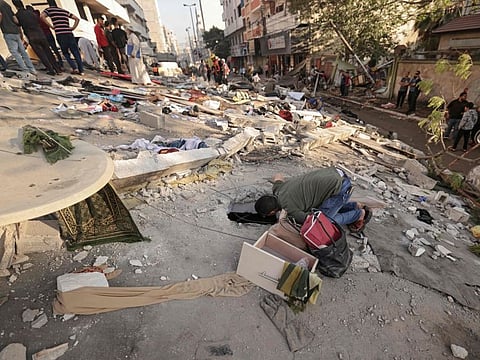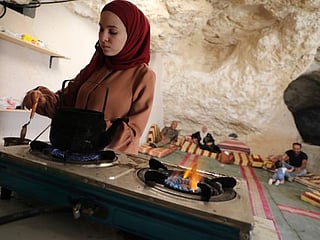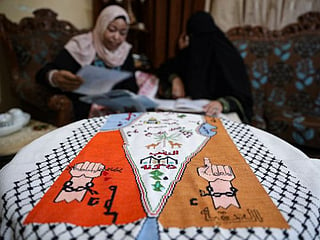Israel bombs Hamas Gaza chief’s home as aerial assault enters 7th day
153 killed in Gaza; 12 shot dead by Israel in West Bank; diplomats push to restore calm

Gaza: Israel bombed the home of Yehia Sinwar, Hamas’s chief in Gaza early on Sunday and sirens warning of rocket attacks sounded in Israeli border towns shortly after dawn as hostilities stretched into a seventh day with no sign of abating.
At least 153 people have been killed in Gaza since Monday, including 42 children, health officials said. Israel has reported 10 dead, including two children.
The United Nations Security Council was due to meet later on Sunday to discuss the worst outbreak of Israeli-Palestinian violence in years.
UN Secretary-General Antonio Guterres reminded all sides “that any indiscriminate targeting of civilian and media structures violates international law and must be avoided at all costs, UN spokesman Stephane Dujarric said in a statement on Saturday.
Destruction of media tower
Both Israel and Hamas, the Islamist group that runs the enclave, insisted they would continue their cross-border fire after Israel destroyed a 12-storey building in Gaza City that housed the US Associated Press and Qatar-based Al Jazeera media operations.
The Israel military said the Al Jala building was a legitimate military target, containing Hamas military offices, and that it had given advance warnings to civilians to get out of the building.
The AP condemned the attack, and asked Israel to put forward evidence. “We have had no indication Hamas was in the building or active in the building,” it said in a statement.
Intercepted
In what Hamas called a reprisal for Israel’s destruction of the Al Jala building, it fired 120 rockets overnight, the Israeli military said, with many intercepted and around a dozen falling short and landing in Gaza.
Israelis dashed for bomb shelters as sirens warning of incoming rocket fire blared in Tel Aviv and the southern city of Beersheba. Around 10 people were injured while running for shelters, medics said.
In a burst of air strikes early on Sunday, the Israeli military said it struck the home of Yehya Al Sinwar in the southern Gaza City of Khan Younis. Sinwar, who was released from an Israeli prison in 2011, heads the political and military wings of Hamas in Gaza.
Another air strike killed a Gaza neurologist and wounded his wife and daughter, Palestinian medics and relatives said.
Israel’s security cabinet was due to meet early Sunday to discuss the hostilities. Prime Minister Benjamin Netanyahu said in a televised address late on Saturday that Israel was “still in the midst of this operation, it is still not over and this operation will continue as long as necessary”.
Al Aqsa
Hamas began its rocket assault on Monday after weeks of tensions over a court case to evict several Palestinian families in East Jerusalem, and in retaliation for Israeli police clashes with Palestinians near the city’s Al Aqsa Mosque, Islam’s third holiest site, during the Muslim holy month of Ramadan.
Speaking to crowds of protesters in the Qatari capital of Doha, Hamas chief Ismail Haniyeh said late on Saturday that the underlying cause of the hostilities was Jerusalem.
“The Zionists thought ... they could demolish Al Aqsa Mosque. They thought they could displace our people in Sheikh Jarrah,” Haniyeh said.
“I say to Netanyahu: do not play with fire,” he continued, amid cheers from the crowd. “The title of this battle today, the title of the war, and the title of the intifada, is Jerusalem, Jerusalem, Jerusalem,” using the Arabic word for ‘uprising’.
Israel claims all of Jerusalem as its capital, a status not generally recognised internationally. Palestinians want East Jerusalem - captured by Israel in the 1967 Arab-Israeli war - as the capital of a future state.
Hamas, Islamic Jihad and other militant groups have fired more than 2,000 rockets from Gaza since Monday, the Israeli military said on Saturday.
Israel has launched more than 1,000 air and artillery strikes into the densely populated coastal strip, saying they were aimed at Hamas and other militant targets.
War crimes
Earlier this week, the International Criminal Court’s chief prosecutor, Fatou Bensouda, told Reuters the court was “monitoring very closely” the latest hostilities, amid an investigation now under way into alleged war crimes in earlier bouts of the conflict.
Netanyahu accused Hamas of “committing a double war crime” by targeting civilians, and using Palestinian civilians as “human shields”.
There has been a flurry of US diplomacy in recent days to try to quell the violence.
President Joe Biden’s envoy, Hady Amr, arrived in Israel on Friday for talks. Biden spoke with both Netanyahu and Palestinian President Mahmoud Abbas late on Saturday, the White House said.
But any mediation is complicated by the fact that the United States and most Western powers do not talk to Hamas, which they regard as a terrorist organisation.
In Israel, the conflict has been accompanied by violence among the country’s mixed communities of Jews and Arabs, with synagogues attacked and Arab-owned shops vandalised.
There has also been an upsurge in deadly clashes in the occupied West Bank. At least 12 Palestinians have been killed by Israeli troops in the West Bank since Friday, most of them during clashes.
Sign up for the Daily Briefing
Get the latest news and updates straight to your inbox









